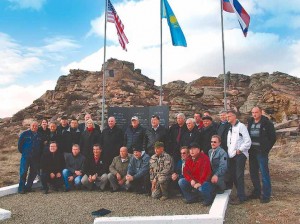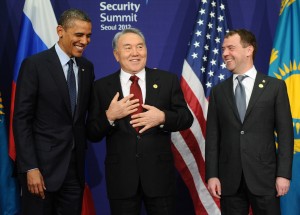 ASTANA – The 2014 NTI Nuclear Materials Security Index, which assesses nuclear materials security conditions in 176 countries and which was released on Jan. 8 by the Washington-based Nuclear Threat Initiative (NTI), reported progress in global efforts to reduce and secure nuclear materials while noting main challenges that remain in this area such as creating a unified global system for monitoring all nuclear materials.
ASTANA – The 2014 NTI Nuclear Materials Security Index, which assesses nuclear materials security conditions in 176 countries and which was released on Jan. 8 by the Washington-based Nuclear Threat Initiative (NTI), reported progress in global efforts to reduce and secure nuclear materials while noting main challenges that remain in this area such as creating a unified global system for monitoring all nuclear materials.
“World leaders at the third Nuclear Security Summit in the Netherlands in March 2014 can point to measurable progress toward the goal of reducing and securing the materials needed to build a nuclear bomb,” the report said.
The report, developed together with the Economist Intelligence Unit (EIU), was released at a press conference in the U.S. capital headlined by former U.S. Senator and NTI Co-Chairman Sam Nunn and NTI President Joan Rohlfing.
“We know there is nearly 2,000 metric tons of this material spread across hundreds of sites in 25 countries, and we know much of it is not effectively secured,” Nunn said. “We know that terrorists would only need enough highly enriched uranium to fit into a 5-pound bag of sugar or an amount of plutonium the size of a grapefruit.”
The index, Nunn said, was created to respond for this sobering set of facts. “I view the Index as a framework—grounded in solid data which should help inform our priorities globally in terms of securing nuclear material and preventing catastrophic terrorism.”
The second edition of the NTI Index assesses progress states have made in improving nuclear materials security conditions. The analysis in the report was based on six factors: quantities and sites, security and control measures, global norms, domestic commitments and capacity, and risk environment.
According to the report, seven countries—Austria, Czech Republic, Hungary, Mexico, Sweden, Ukraine and Vietnam—have removed all or most of their stocks of weapons-usable nuclear materials from their territories. The number of nations with appreciable fuel for atomic bombs also lowered to 25 from 32 since the first report was issued in January 2012.
With one being the most positive ranking, Kazakhstan was ranked 15 among the 25 states with weapons-usable nuclear materials with 73 points. [While the authors of the report say Kazakhstan’s ranking remains unchanged from the previous report, the 2012 report actually had Kazakhstan at the 22nd position with 71 points.].
The report also noted areas where Kazakhstan can improve.
“Although Kazakhstan improved its score by becoming a member of the G-8 Global Partnership Against the Spread of Weapons and Materials of Mass Destruction, this improvement is offset by the fact that Kazakhstan now transports weapons-usable nuclear material domestically,” the report noted without explaining how this affects the security of materials or the rankings since the transportation has been done to the highest security standards and no incidents were ever reported.
“In the future, Kazakhstan’s nuclear materials security conditions could be further improved by reducing its materials quantities, strengthening its laws and regulations for the physical security of materials in transport to reflect the latest IAEA nuclear security guidelines, publishing an annual report about nuclear security, and making public declarations about its materials stocks,” the report said. Its authors also highlighted what they consider Kazakhstan’s uncertain political situation, governance challenges and corruption among public officials as adversely affecting nuclear materials security conditions.
The NTI Index encourages governments to take actions to reduce risks and to provide assurances about the security of the world’s deadliest materials.
“The NTI Index reveals positive developments in a host of countries, reflected in their improved scores, when it comes (a) to decreasing quantities of materials; (b) to strengthening physical protection measures; and (c) to passing new domestic laws and regulations aimed at better securing materials at facilities and during transport, which is when materials are most vulnerable to theft,” the report stated.
Recommendations about the need to ensure greater transparency and accountability were basically provided to all countries with nuclear materials. Generally, the Index recommends that states:
- Build confidence in the effectiveness of their security practices through reassuring steps such as participating in international peer reviews, publishing relevant regulations and declaring inventories.
- Become parties to the nuclear security treaties that govern nuclear terrorism and physical security.
- Strengthen voluntary mechanisms such as the IAEA’s Nuclear Security Fund and the World Institute for Nuclear Security.
- Secure military and other non-civilian materials to the same or higher standards as civilian. About 85 percent of global stocks of weapons-usable nuclear materials are outside civilian programs (because they are either military or other non-civilian programs) and are not covered by IAEA guidelines or the physical protection treaty or its 2005 amendment.
At the report launch, NTI President Joan Rohlfing said governments should make it a priority to build a global nuclear materials security system.
“As the Index findings make clear, right now we have no shared global system for nuclear security,” Rohlfing said. “That means no common international standards. No governing body with the mandate and resources for proper oversight. No expectation for states to take actions that build confidence in the effectiveness of their security practices. And finally, no mechanism for holding countries accountable.”
Such calls support and build on the general thrust of the discussions at the second Global Nuclear Security Summit in Seoul in March 2012, including the remarks made there by Kazakhstan President Nursultan Nazarbayev. In particular, he called for the unification and codification of accumulated international experience in developing the peaceful atom with a view of adopting legally binding standards of nuclear safety. He also called for transparency and quick reaction to any incidents at nuclear facilities with a view of developing clear mechanisms of rapid reaction to emergencies; as well as equality and trust, meaning equal rights for all states to access peaceful nuclear technologies.
NTI and the EIU relied on the International Panel of Experts to shape the current NTI Index. The group included experts from Argentina, Australia, China, France, India, Japan, Kazakhstan, Pakistan, Russia, South Africa, Sweden, the United Kingdom, the United States, and Vietnam. Among the panelists were a representative from the World Institute for Nuclear Security and a former IAEA official. NTI, together with the international panel of nuclear security experts and a number of technical advisors, developed the framework and priorities that define effective nuclear materials security conditions.
Eliminating weapons-usable nuclear materials is seen as the most significant step a country can take toward ensuring that terrorists can’t get access to the materials needed to build a nuclear bomb.
Since 2012, Kazakhstan has reduced its stock of weapons-usable nuclear material. This decrease was made possible, in part, by several steps and operations implemented in previous years.
Thus, Kazakhstan took a step to eliminate 33 kilograms of high-enriched uranium at the Institute of Nuclear Physics in Almaty by down blending the material into low-enriched uranium at the Ulba Metallurgical Plant in Ust-Kamenogorsk.
In addition, Kazakh, U.S. and Russian agencies successfully completed a complicated project known as the Degelen Project, which ensured permanent safe storage for hundreds of kilograms of nuclear material that had remained in Degelen Mountain tunnels on the former Semipalatinsk nuclear test site in Eastern Kazakhstan since the Soviet nuclear tests.
The once-secret project at the Degelen Mountain Complex took 17 years to complete and involved hundreds of kilograms of weapons-usable nuclear material—both plutonium and highly-enriched uranium—that had been secured in sealed tunnels. Scavenger activity in the area raised the threat that some of the material might be stolen and used for dangerous purposes. The tunnels were reopened, filled with special cement that rendered the nuclear material unusable for weapons purposes, and then resealed.
This collaborative effort, announced at the 2012 Nuclear Security Summit in Seoul by the presidents of Kazakhstan, the United States and the Russian Federation, was unprecedented in its actions to combat the threat of nuclear proliferation and nuclear terrorism.
In August 2013, Harvard University’s Belfer Center’s Project on Managing the Atom (MTA) released a report called “Plutonium Mountain: Inside the 17-Year Mission to Secure a Dangerous Legacy of Soviet Nuclear Testing.” In the report, Eben Harrell, an associate with MTA, and Pulitzer Prize winning author and Washington Post reporter David Hoffman tell how dedicated scientists and engineers in three countries overcame suspicions, secrecy, bureaucracy and logistical obstacles to secure more than a dozen bombs worth of plutonium that had been left behind at the Semipalatinsk test site in Kazakhstan after the collapse of the Soviet Union.
The former Soviet Union conducted underground nuclear tests at the Degelen Mountain Complex from 1961 to 1989. In 1991, even before independence from the USSR, President Nursultan Nazarbayev closed down the Semipalatinsk nuclear test site, one of the largest in the world, making Kazakhstan the first country to do so.
After independence in 1991, Kazakhstan voluntarily renounced the world’s fourth largest nuclear arsenal, returned to Russia the nuclear weapons it inherited from the former Soviet Union and joined the Nuclear Non-Proliferation Treaty as a non-nuclear weapon state.
Over the past 22 years, Kazakhstan has remained a strategic partner in some of the most important nuclear security and nonproliferation efforts worldwide. Kazakhstan is cooperating with the world community to make the world safer from the threat of nuclear terrorism by converting and removing nuclear materials that may be attractive to terrorists, securing nuclear material at production and storage facilities, as well as combating the trafficking of illicit nuclear materials.
In addition, Kazakhstan has proven its commitment to preventing the proliferation of nuclear weapons and is working together with other states to continue reducing the proliferation threats associated with nuclear materials, technologies and expertise.
In 2011, NTI chose President Nazarbayev among the 10 major public figures from Australia, Britain, Germany, Norway, Russia, the United States and the countries of the Middle East, to be recognized with an award. According to NTI co-chairmen Sam Nunn and Ted Turner, whose original contribution made NTI functioning possible, President Nazarbayev was chosen for his significant contribution to nuclear disarmament.
